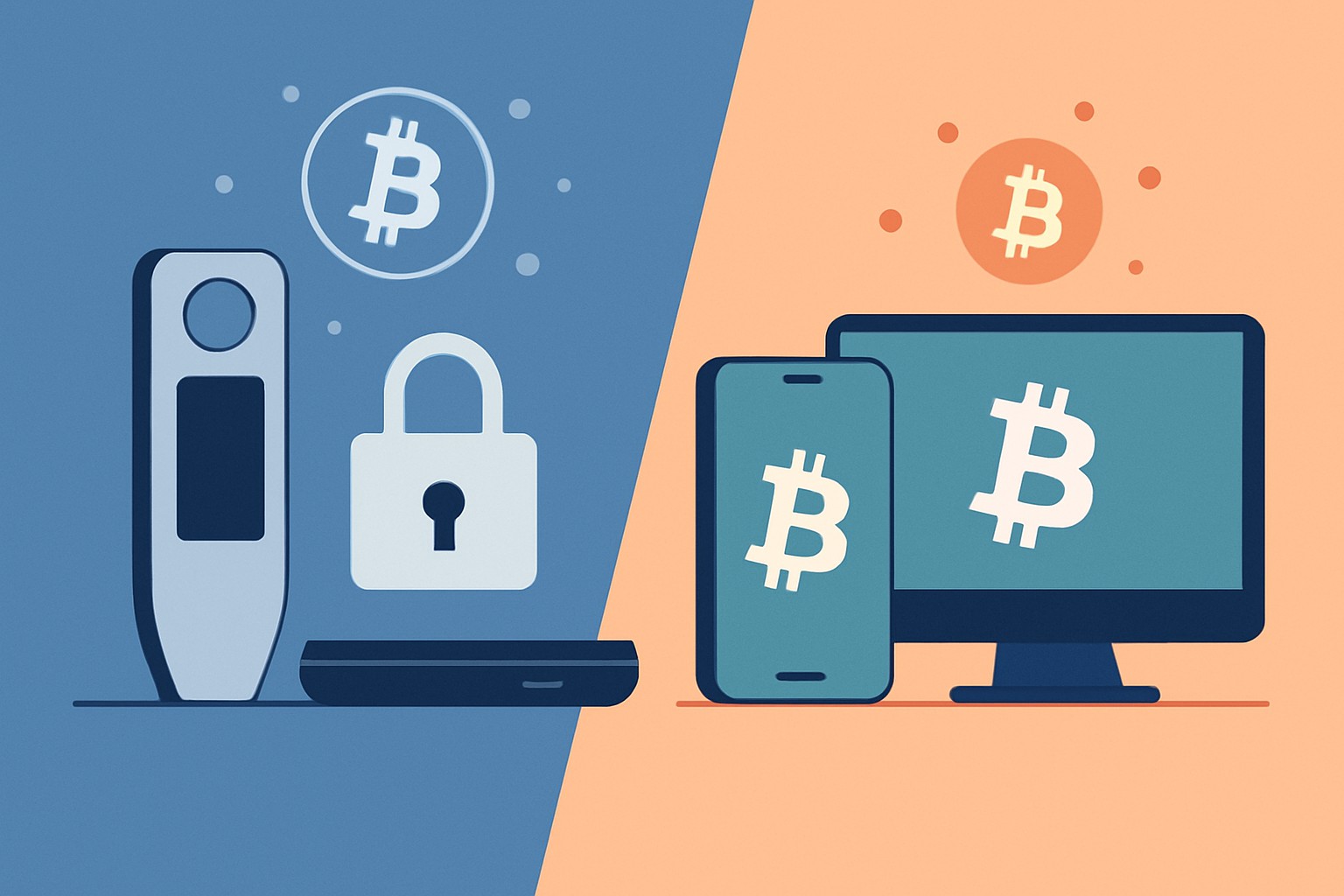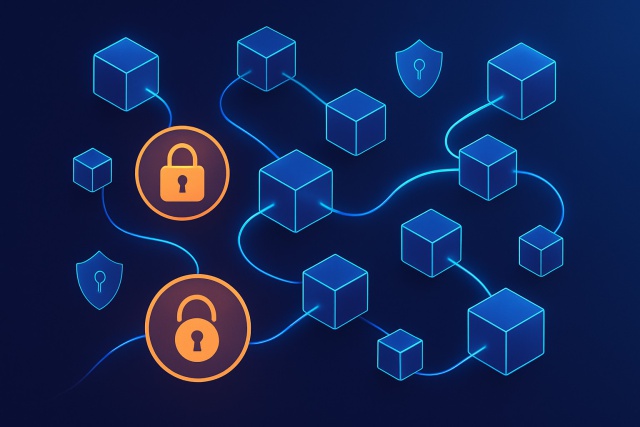Crypto Cold Storage vs Hot Wallets Compared


Cryptocurrency wallets are important for managing your digital assets, and when it comes to security, crypto cold storage isn't just a nice-to-have - it's top of the list. This guide dives into the nuts and bolts of cold storage versus hot wallets and sheds light on their perks and pitfalls.
Understanding Crypto Wallets and What You Really Need to Know (No Tech Jargon, Promise)
Cryptocurrency wallets are digital vaults that keep your public and private keys safe. They allow you to send, receive and manage your crypto assets with peace of mind. Think of public keys as the addresses where your funds arrive. Private keys are the all-important credentials that grant you access and full control over those assets.
- Public keys work like your wallet’s address and let others send cryptocurrency your way without fuss.
- Private keys are secret codes that put you in control of your funds and allow you to approve transactions.
- Seed phrases are your safety net—a backup list of words you hope never to use but can recover your wallet when things go sideways.
- Wallet addresses are the hashed shorthand versions of your public keys that you use when making transactions.
- Wallet encryption is your trusty bodyguard, keeping your private keys locked with passwords or biometric locks so no unwanted guests can sneak in.
What Does Crypto Cold Storage Really Mean
Crypto cold storage means stashing your cryptocurrency private keys completely offline and far from the internet's dangers. The usual options for cold storage include hardware wallets, paper wallets and air-gapped computers. Each offers a sturdier defense against hackers and malware that appear in online environments.
- Hardware wallets are physical gadgets designed to keep your keys locked up tight and safely offline.
- Paper wallets involve printing your keys on paper and storing them somewhere safe offline, like a digital treasure map under lock and key.
- Air-gapped offline computers never connect to the internet. They are like secret bunkers for creating and managing keys securely.
- Physical security includes practical steps to protect cold wallets from being stolen, lost, or damaged by the environment because accidents and mischief strike when you least expect it.
The Many Perks of Using Cold Storage
Cold storage is often touted as one of the safest ways to guard your cryptocurrencies. By keeping those private keys offline it sidesteps usual culprits like hacking, phishing or sneaky malware attacks. It’s a strategy that really shines for long-term holders or institutional investors who focus on security over convenience because sometimes safety means a bit of patience. Cold wallets aren’t fazed by internet outages or service hiccups so your assets are still within reach whenever you need them.
Challenges with Cold Storage and What Makes It Tricky
While cold storage definitely scores high on security, it can be a bit of a hassle when it comes to everyday transactions and usually calls for a more hands-on setup.
What Exactly Are Hot Wallets Anyway?
Hot wallets are cryptocurrency wallets that remain connected to the internet, which makes accessing your assets quicker and more convenient—think of them as your day-to-day digital cash.
- Software wallets that you install on your computer and use to hop online for your transactions—think of them as your trusty desktop sidekick.
- Mobile wallets designed specifically for smartphones that put convenience and lightning-fast access right at your fingertips.
- Web wallets you can access through browsers and often cozy up to decentralized apps for a seamless experience.
- Exchange wallets provided by crypto exchanges hold your assets online like a virtual safe deposit box but with more digital flair.
Advantages of Hot Wallets and Why They Often Steal the Spotlight
Hot wallets are a real lifesaver for those who jump in and out of transactions or need to access their funds quickly. Since they’re hooked up to the internet they connect effortlessly with decentralized finance (DeFi) platforms, NFT marketplaces and trading exchanges—no fuss. Many hot wallets have user-friendly interfaces and handle multiple currencies like a champ. They breeze through transactions quickly.
Limitations of Hot Wallets You Should Keep in Mind
The main drawback of hot wallets is that they are naturally more vulnerable to cyber threats like hacking and phishing attacks. Since they are always connected to the internet, their security depends on how well users protect themselves and how robust the wallet’s software is.
Comparing Cold Storage and Hot Wallets for the Lowdown You Might Actually Want to Know
| Feature | Cold Storage | Hot Wallets |
|---|---|---|
| Security Level | Very High: Keeps private keys offline, tucked away from online threats like a fortress | Moderate to Low: Always online, which unfortunately means more doors for troublemakers |
| Accessibility | Low: You’ll need to be hands-on with physical access and setup | High: Ready when you are, just a few clicks away on any internet device |
| Use Cases | Best for long-term storage and holding large stacks | Perfect for day-to-day spending, frequent trades, and quick moves |
| Cost | Medium to High: Involves buying specialized hardware or careful handling — worth the peace of mind | Low to none: Usually free software or bundled with exchange services |
| Setup Complexity | Moderate to High: Takes a bit of tech savvy for device configuration and backing up keys | Low: Just download the app and you’re good to go |
| Risk Factors | Watch out for physical damage or accidentally losing your device or backups | Vulnerable to hacks, phishing attempts, malware, and the risks that come with trusting third parties |
This comparison clearly shows that cold storage usually takes the cake when it comes to keeping sizable crypto holdings safe thanks to its tougher security. Hot wallets are the go-to for those who want speedy access and tend to make frequent transactions even if that means accepting a bit more cyber risk.
Guidelines for Safely Using Crypto Cold Storage
Handling crypto with care is no joke, and if you want to keep those digital coins under lock and key, cold storage is the way to go. Here’s the lowdown on how to do it right—because when it comes to your assets, a little caution goes a long way.
Setting up and maintaining cold storage properly is absolutely key for keeping your assets safe and sound. It’s all about choosing trustworthy hardware wallets and creating wallets offline in a secure way. You also need to make solid backups you can rely on and take physical security seriously to protect your devices from theft or accidental damage.
Pick a hardware wallet brand that gets rave reviews for solid security—think Ledger or Trezor, the crowd favorites.
Set up your wallet completely offline and if you can swing using air-gapped devices, even better. It’s like giving malware a big old ‘no entry’ sign.
Take your time writing down the seed phrase using sturdy materials—you’ll want that hard to smudge or tear—and stash a few copies in different safe spots just to be extra safe.
Store your cold wallet hardware somewhere serious. Fireproof, waterproof safes or a trusty bank deposit box are great bets to keep thieves and disasters at bay.
Make it a habit to run regular security checks and update your firmware. Think of it as giving your wallet a little tune-up to stay sharp and catch any sneaky issues before they turn into headaches.
Key Tips for Keeping Hot Wallets Secure (Because No One Wants Their Coins Gone in a Flash)
To keep risks at bay with hot wallets it’s wise for users to lean on multi-factor authentication and pick trustworthy wallet software. They should stay sharp against phishing scams and make sure their software is always up to date.
Opt for wallet software that’s reputable and widely trusted, ideally something with open-source code or a robust community keeping a close eye on things.
Whenever possible, enable multi-factor authentication and biometric security features because it’s like adding a double deadbolt to your digital front door.
Keep your wallet and device software up to date. Those updates might seem like a hassle but they are your best bet to patch up any sneaky security holes.
Always hop on secure, private Wi-Fi or use a trusty VPN when accessing your wallet since you don’t want to leave the front door wide open.
Avoid using public Wi-Fi networks for transactions or logins. They might seem convenient but they are basically a playground for data snoopers and man-in-the-middle attacks.
Choosing Between Cold Storage and Hot Wallets for Your Needs
Deciding between cold storage and hot wallets usually boils down to your crypto goals and how often you make transactions along with how much risk you’re willing to roll with. Cold storage tends to be the go-to for individuals aiming for rock-solid long-term security on their assets.
- Cold storage, thanks to its tougher security and offline shield.
- Hot wallets are your go-to since they give you instant access without any fuss.
- Hot wallets that come built into your mobile device often strike the perfect balance of speed and ease.
- Cold wallets really help keep those pesky hackers at bay.
- Cold storage tends to be the wiser call, at least from what I’ve seen.
Combining Cold Storage and Hot Wallets for a Balanced Approach That Just Makes Sense
Many seasoned crypto users juggle crypto cold storage and hot wallets to find a balance between security and convenience. Typically, they stash most of their assets in cold storage to keep them secure and keep a modest chunk in hot wallets for quick access when making trades or payments.
- Keep your main portfolio tucked away offline in cold storage devices to protect those long-term holdings like a treasure chest.
- Maintain a smaller stash in hot wallets, perfect for daily spending or actively trading without breaking a sweat.
- Make it a habit to regularly audit your wallets as a health check-up to monitor balances and enhance security.
- When moving funds between cold and hot wallets, proceed with caution by using encrypted transactions and following all usual precautions because nobody likes surprises in their crypto journey.






